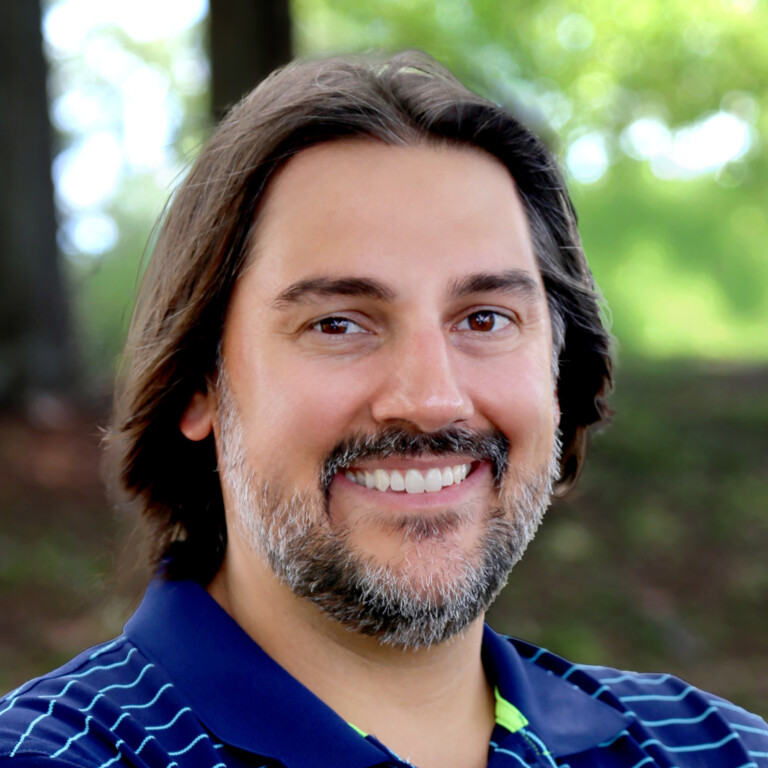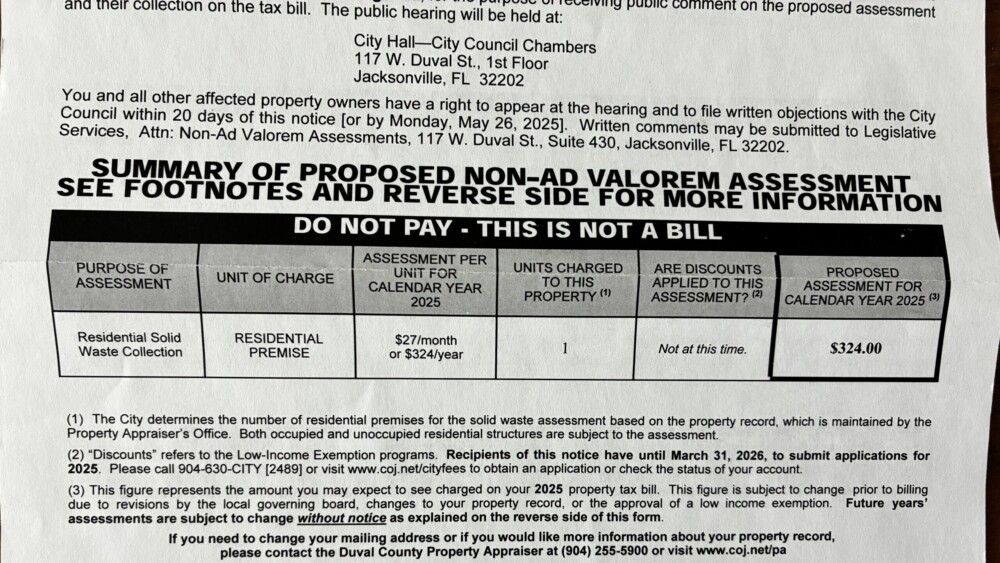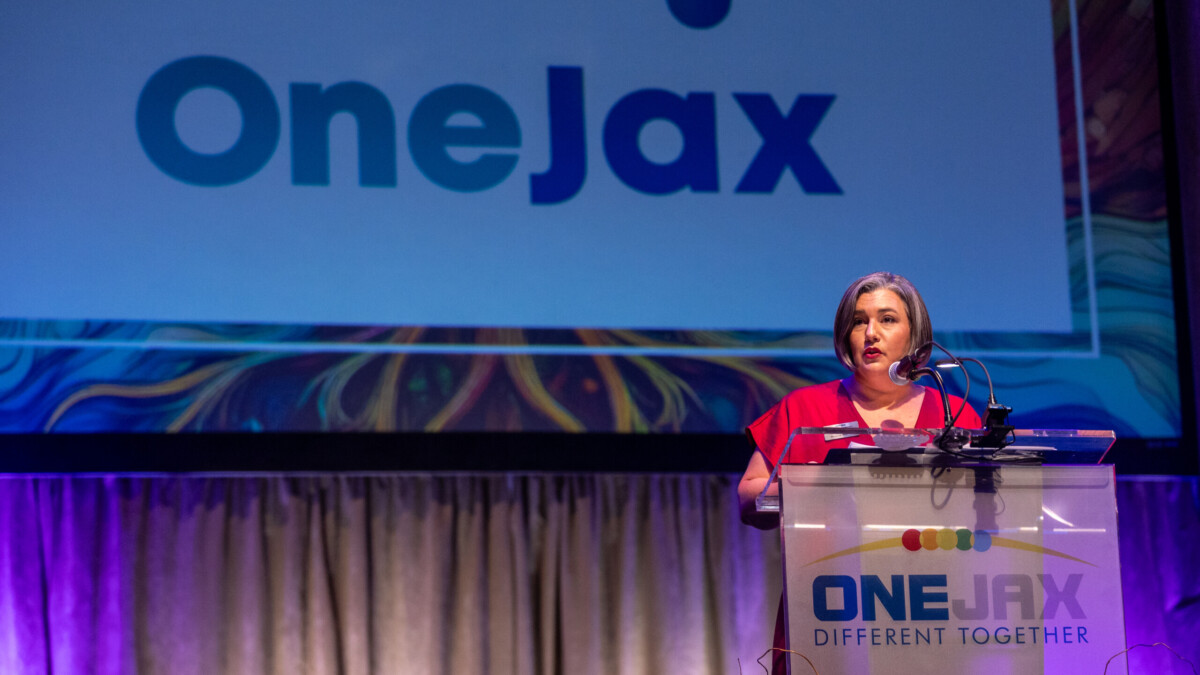Jacksonville residents’ garbage collection fee is about to increase for the first time in nearly 15 years.
In an 11-7 vote Tuesday, City Council approved a plan that will phase in a $232.2 hike in Jacksonville’s annual residential solid waste assessment, from $151.80 to $384, by 2027 – a decision that didn’t sit well with dozens of people who came to the meeting to protest the increase.
The increase is meant to bring the city’s garbage collection fee in line with the actual cost for the service – $30.40 per month per household, according to the City Council Auditor’s Office.
Council member Matt Carlucci, who introduced Ordinance 2025-266, says the higher rate will also address the growing deficit in the city’s solid waste fund, which has been covered by loaning money from the general fund.
The loan, which the city is required by city code to repay, is estimated to reach $100 million by the end of the year.
“For over 15 years, the Jacksonville City Council has avoided raising the solid waste disposal fee, not because the cost has stayed the same, but because politics got in the way,” Carlucci told Jacksonville Today on Thursday.
The city has to repay the general fund loan because of its interlocal agreement with the Jacksonville Beaches and Baldwin.
As part of Duval County’s consolidated city-county government, the four communities pay property taxes into the city’s general fund and also pay their own garbage fees that cover the cost of service, according to Mayor Donna Deegan’s administration.
Carlucci says for the residents of the Beaches and Baldwin, the general fund loan is akin to a double tax on garbage service.
According to Carlucci, new revenue from the increased fees will free up money from the city’s solid waste franchise fees to repay the loan and allow the now untouched general fund dollars to go toward other city services.
Increase schedule and some relief
This year, Jacksonville homeowners will see the first of three garbage fee increases from $151.80 to $324 annual, or from $12.65 to $27 per month per household. In 2026, the assessment will rise to $354 for the year, or $29.50 per month per month. The final increase in 2027 will bring the annual rate to $384, or $32 per month.
Households may avoid the increase if they qualify for assistance through the City User Fee Low-Income Exemption Program, which Council created when it passed a bill in February directing the mayor’s office to send communications to homeowners about the proposed increase and setting Tuesday’s public hearing.
To qualify, a household income has to fall within 150% of the the federal poverty level. The home’s stormwater fee will be waived, and the solid waste fee will remain $151.80 per year. According to city officials, this past year, 150% of the federal poverty level for a family of four was $46,800. Homeowners must fill out an application with the city to qualify.
Mayor Donna Deegan administration, which is supporting the increase, provided this statement to Jacksonville Today following the vote Tuesday:
“This issue has needed a solution for a long time, and it has become more expensive to address the longer Jacksonville has waited. We appreciate the bipartisan group of City Council members who courageously came together to fix a problem that they didn’t create,” said Phil Perry, the mayor’s chief communications office.
Debate and public pushback
Council member Raul Arias compared Jacksonville’s historically low fees to much higher rates in other major Florida cities like Miami and Tampa.
Even some council members who supported the increase admitted problems with how the proposal was rolled out.
“The information that we sent out from this city to the residents of this community did not have information that looked its best. It could have been and should have been better,” Rahman Johnson said.
“But at the end of the day, things in the past 10 years to 12 years that this fee (pays for) has gone up. The cost of fuel has gone up. The wages have continued to go up. The cost of operating a landfill has gone up. … We can’t bury tomorrow in yesterday’s trash,” Johnson said.
Virtually every member of the public who spoke on the increase Tuesday opposed it. Some noted that they will be charged the increased fee even at vacant or unoccupied properties that they own.
Marzolla Diaz said she understands the increasing costs but argued households need more time to adjust to the rising fees.
“As a single homeowner who lives responsibly and minimizes waste, I’m especially impacted by this fee. I often skip trash pickup because I consume minimally,” she said. “I take the time to flatten my recyclables and ensure my weight is properly managed. I’m not the kind of resident that overburdens our waste system. Yet, this blanket fee penalizes everyone equally, regardless of usage.”
Council member Rory Diamond called the fee increase a tax hike, comparing it to the half-cent sales tax approved by voters in 2020 to pay for improvements to aging Duval County Public Schools facilities and the 2021 local option gas tax increase, which will pay for the Emerald Trail development and the Jacksonville Transportation Authority’s automated vehicle project, among other infrastructure improvements.
“This is maybe one of the worst pieces of legislation I’ve seen come through here because it actually hurts people. This bill hurts people,” Diamond said.
These council members voted in favor of the increase:
- Randy White
- Ken Amaro
- Raul Arias
- Joe Carlucci
- Chris Miller
- Jimmy Peluso
- Will Lahnen
- Matt Carlucci
- Tyrona Clark-Murray
- Ju’Coby Pittman
- Rahman Johnson
These voted against:
- Kevin Carrico
- Rory Diamond
- Terrance Freeman
- Nick Howland
- Reggie Gaffney Jr.
- Mike Gay
- Ron Salem
Council member Michael Boylan was absent from Tuesday’s meeting.







